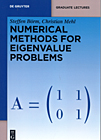- About MAA
- Membership
- MAA Publications
- Periodicals
- Blogs
- MAA Book Series
- MAA Press (an imprint of the AMS)
- MAA Notes
- MAA Reviews
- Mathematical Communication
- Information for Libraries
- Author Resources
- Advertise with MAA
- Meetings
- Competitions
- Programs
- Communities
- MAA Sections
- SIGMAA
- MAA Connect
- Students
- MAA Awards
- Awards Booklets
- Writing Awards
- Teaching Awards
- Service Awards
- Research Awards
- Lecture Awards
- Putnam Competition Individual and Team Winners
- D. E. Shaw Group AMC 8 Awards & Certificates
- Maryam Mirzakhani AMC 10 A Awards & Certificates
- Two Sigma AMC 10 B Awards & Certificates
- Jane Street AMC 12 A Awards & Certificates
- Akamai AMC 12 B Awards & Certificates
- High School Teachers
- News
You are here
Numerical Methods for Eigenvalue Problems

Publisher:
Walter de Gruyter
Publication Date:
2012
Number of Pages:
208
Format:
Paperback
Series:
De Gruyter Graduate Lectures
Price:
34.95
ISBN:
9783110250336
Category:
Textbook
[Reviewed by , on ]
John D. Cook
10/9/2012
Numerical Methods for Eigenvalue Problems gives a brief account, in about 200 pages, of its subject. Although the book is published in a graduate lecture series, the preface says that the book is intended for third or fourth year undergraduates.
The first indication that the book is written for undergraduates is that it has a little color: section headings are blue, and highlighted sections are is boxes shaded blue. (Is there an unwritten rule that graduate text books must be monochrome but undergraduate books need a little color?) The second indication that this is an undergraduate book is a list of learning objectives at the beginning of each chapter, a useful feature seldom found in graduate texts.
Numerical Methods is mostly self-contained. The reader is expected to have a basic understanding of linear algebra, is not expected to have any previous knowledge of spectral theory. In order to be both self-contained and brief, the authors have chosen a representative set of topics in eigenvalue problems, including problems for dense and sparse matrices, rather than attempt a comprehensive survey. The book contains proofs of all the major theorems, but sometimes the theorems are stated and proven in less than full generality.
The book emphasizes algorithms and theory; it does not say much about computation. However, there are parenthetical comments throughout explaining how the realities of floating point computation would effect implementations of the algorithms.
Numerical Methods for Eigenvalue Problems gives an accessible undergraduate introduction to topics more often taught at a graduate level. It covers material of practical and theoretical importance without getting bogged down in things best explored in more advanced classes.
John D. Cook is a research statistician at M. D. Anderson Cancer Center and blogs at The Endeavour.
The table of contents is not available.
- Log in to post comments




